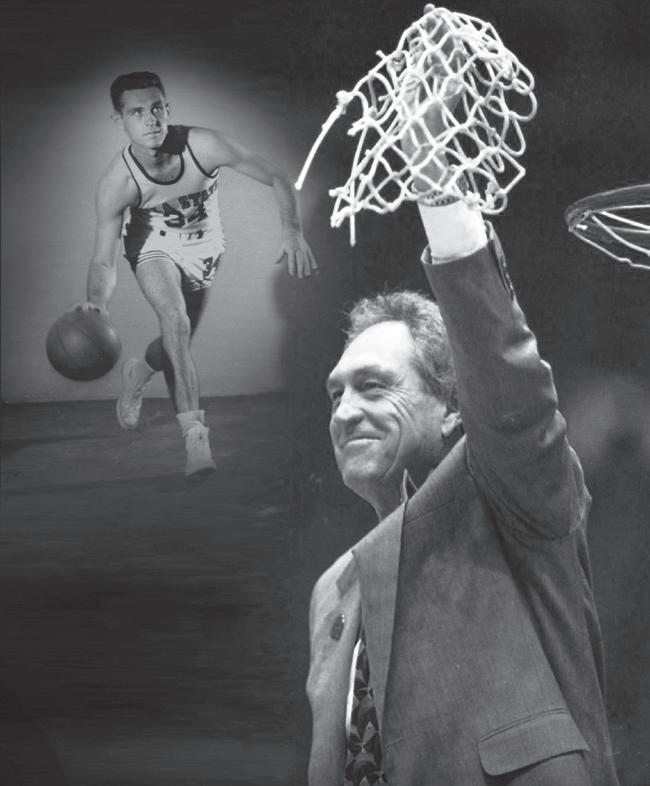
26 minute read
EDDIE SUTTON
Following the death of Eddie Sutton, POSSE Magazine asked for the thoughts and memories from a group of people who each had a unique perspective on the Hall of Fame coach.
Eddie sutton: the change agent
BY LARRY REECE
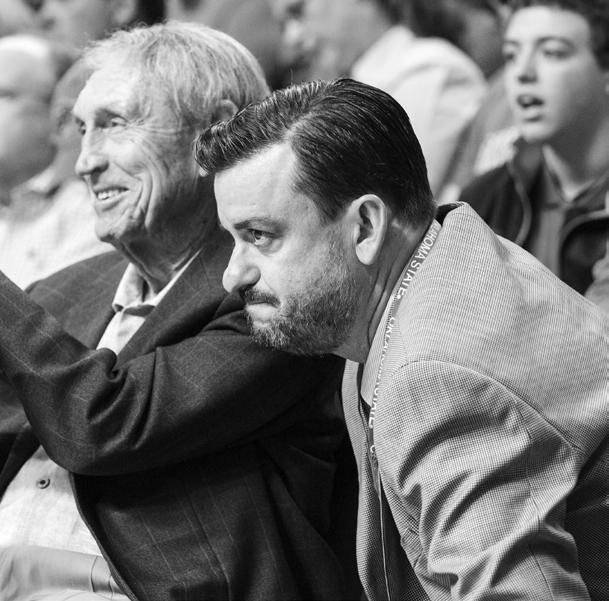
Larry Reece has been the public address voice of OSU Athletics since 1991 and serves as the department’s senior associate athletic director for development.
In journalism school at OSU they taught me to never bury the lede. So here it is: Coach Eddie Sutton made my life better.
I was a student when Coach came home, and Stillwater was buzzing with excitement with Mr. Iba leading the parade. Coach immediately started working on his culture of Dedication, Discipline and Defense. He began preaching about the Sixth Man and the difference a fanbase could make in a game.
Coach Sutton started building his army by being seen everywhere, and he got the students invested by doing his coaches shows in their living rooms at each fraternity and sorority. The students paid him back. They lined up. They camped out. They brought the noise and the spirit.
During coach Sutton’s first year, my roommate and I raced to front row seats with basketballs on our heads. We did everything we could to help Sutton and his Cowboys. By year two, I had been hired by Sports Information Director Steve Buzzard to try to do what I could to add to the atmosphere on the public address. It was a dream come true for me and such a magical time for OSU.
Following that season with Sean (Sutton), Darwyn (Alexander), Corey (Williams), Cornell (Hatcher), Byron (Houston) and some young guy they called Big Country, Coach Sutton sent me a letter. Coach told me I was worth 10 points a game on the mic. I share this not to brag that I averaged double digits for a D-I college basketball program, but to show you the essence of Coach. You see, he didn’t have to do that. He didn’t have to make me feel special ... he wanted to make me feel special. And he did it all of the time. Coach loved to lift people up, and he seemed to always know when and how to do it, in good times and bad.
Coach Sutton was a legendary letter writer. It is becoming a lost art, but he was the most prolific I have ever seen. Thank you notes, congratulations, nice to meet you, just because ... he did it all.
His birthday calls were classic. He tried to be the first to call you in the morning, and he would croon the entire song. He really got a kick out of that.
Coach Sutton felt like OSU gave him a second chance, and he paid it forward with second chances for players. I’m not saying these players were in trouble. They just needed a new home and the right coach. Think of all the transfers who became difference makers for the OSU basketball program: the Graham twins, Daniel Bobik, John Lucas — all on a Final Four team together with Tony Allen. Tony was from the mean streets of Chicago, but in Stillwater he became a changed man. He credits much of his success to his coach. Doug Gottlieb needed a second chance. He found it in Stillwater and with his dad’s former boss, Eddie Sutton.
Coach Sutton always thought of himself as a teacher, and he taught many a Cowboy how to be better men. How did he do it?
He and Patsy treated them like sons.
Flowers … oh my, the flowers! Coach seemed to always know when to send them, such as an illness or death. I often wondered how he seemed to know what everyone was going through?
Baby Nikes were his signature touch when a new Cowboy or Cowgirl came into the world. When my daughter, Lauren, was born, here came Coach with her first Nike shoes. Lauren wore them, and then we had them put in ceramic. Coach autographed them for us, in bright orange no less.
I would love to know how many letters he wrote, happy birthdays he belted out, second chances he handed out, flowers he sent, Nikes he gave away. He was remarkable. Let’s sum it up this way, Coach Sutton had a huge heart — or as he would put it, a big valentine.
Steve Sutton said it best outside of Coach’s home on the afternoon before he passed. “Beyond basketball, my dad really had a ministry.”
Let’s take a look at some of the things Eddie Sutton did for his alma mater. Out of tiny Bucklin, Kan., he chose OSU (then Oklahoma A&M) and Henry Iba over some of the greatest coaches in history, including Phog Allen and Adolph Rupp. As a player, he led the team in scoring the night Mr. Iba and his boys took down top-ranked KU and Wilt Chamberlain. He also helped take his team to the Elite Eight in 1958.
Coach saved us when we needed saving. You see, when he came home to lead the OSU Basketball program, there wasn’t much to cheer about in Stillwater. Football and wrestling were in NCAA trouble and Cowboy hoops had been to one NCAA tournament over nearly three decades.
Coach built a loyal and true fan base, and together we created the Rowdiest Arena in the Country. Coach used to say that Gallagher-Iba is so intimidating because our fans can reach out and grab the hairs on the opponents’ legs. Our fans know basketball, and they know how to help the good guys.
Eddie Sutton knew how to coach the game, and he immediately brought our program back to national prominence with conference titles and Final Four appearances.
Coach lifted us through our greatest tragedy and helped us make and keep the promise to Remember the Ten! He also chaired the annual Remember The Ten Run, which has now raised more than $250,000 for OSU Counseling Services. Berry Tramel said it best during this difficult time when he called Eddie Sutton “our John Wayne.”
When his friend Norm Stewart was diagnosed with cancer, Coach Sutton helped create Coaches vs. Cancer. Today, OSU Coaches vs. Cancer is consistently among the top fundraising programs in the country. We raise money for cancer research, we salute cancer survivors at home games, and we give cancer-fighting kids and their families the escape of OSU Athletics. Our coaches, staff and student-athletes truly make a difference in their lives. They inspire ours. I believe it is the best thing we do.
Coach Sutton made us believe we could do big things, and the ticket demand he created was the reason we were able to renovate GIA into a comprehensive Athletics Center. The decision to expand by Athletic Director Terry Don Phillips led to the OSU Athletic Village we see today by inspiring Boone Pickens. Boone’s unprecedented generosity would inspire the Greenwoods, Neal Patterson, Cecil O’Brate and many others. It took a village to build the Athletic Village, but Eddie Sutton gave us the initial spark and it changed our mindset forever.
The OSU family continued to pay Coach back, even after his coaching days were over. Son Steve, grandson Hunter and the Sutton family kept him going, and our fans kept loving him up. He lit up any time he knew he was coming back home to Stillwater and Gallagher-Iba Arena. I was thrilled to introduce him each time he made it to a game, and believe me, the

chant “Eddie! Eddie! Eddie!” was music to his ears and helped him continue to fight.
With Coach Sutton’s passing, I found my joy for him outweighing my own sadness. My thoughts kept going to his reunion with the love of his life and his number one assistant coach, Patsy. And his renewed conversations with his coach, Mr. Iba and his longtime friend Whisperin’ Richard (Danel), the barber to so many of us in OSU Athletics. I wish I could’ve been there for his big hug from Brooks Thompson and to see his reunion with the 10 men we lost on January 27, 2001. I know Coach Sutton is back to feeling good, telling stories and making people feel good.
Eddie Sutton helped transform our school, and in many ways he made all of our lives better. OSU is a better place because Eddie Sutton was one of us and because he loved his alma mater. What a ride he gave us. Thank you, Coach Sutton!
Steve Sutton was right. Coach Sutton did have a ministry, and we were all lucky to be part of his congregation. And it’s only fitting for me to close by using Coach’s mantra:
“Always have faith in God, yourself and the Cowboys!”
mutual admiration
BY STEVE BUZZARD
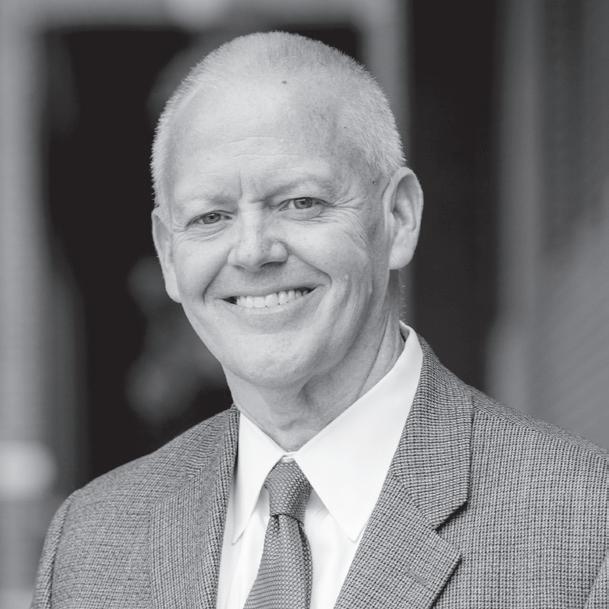
Steve Buzzard is the senior manager for business administration for OSU’s Department of Public Safety. From 1983 through 2006 he served as OSU’s associate athletic director for media relations.
April 11, 1990, was historic for Oklahoma State University. It was the day Eddie Sutton came home.
In perhaps the biggest announcement in the history of OSU Athletics, Sutton was named the school’s head basketball coach. The evocativeness of the moment could not have been scripted any better. In front of dozens of cameras and a throng of print media and prominent OSU figures, the keys to the OSU basketball program were handed to Sutton.
Making the moment event more meaningful was the heartfelt and moving introduction he received from the then-sitting patriarch of Cowboy Basketball, Henry P. Iba.
It was Mr. Iba who had led OSU through its halcyon years of national championships and yet-to-be equaled success. It was Mr. Iba who helped change the landscape of the game of basketball. It was Mr. Iba for whom Eddie Sutton played, learned and respected more than anyone else in the game.
So, on that April day in 1990, a proud coach/teacher introduced his prize pupil. It was heartwarming. It was overdue, and it was the most significant day in the history of OSU Basketball.
Everyone in the room that day (and those who were not but had any insight into Cowboy Basketball) knew that, at that moment, the landscape of the sport at OSU was undergoing a cataclysmic change. I’m not sure any of us had an idea of just how dynamic that change would be.
The drought in OSU Basketball success between Mr. Iba’s tenure and the beginning of Coach Sutton’s was undeniable. At the time Sutton took over, the Cowboys hadn’t been to the NCAA tournament since the 1982-83 season, and that was a first-round loss to Princeton.
The photos of Mr. Iba and Coach Sutton shaking hands that day reveal so much more than simply two great basketball coaches during an iconic moment. The smiles on both faces reveal something much, much deeper. Those smiles represented a homecoming that filled a void in both men.
Eddie Sutton and Henry Iba were connected by more than just basketball genius. They were connected by love of the game. They were connected by a methodology. They were connected by mutual respect. They were connected by a school they both loved.
The last few years of Mr. Iba’s tenure as basketball coach at Oklahoma State were not nearly as successful as he wanted. Adding the duties of athletic director late in his career no doubt contributed to the slide. Have no doubt, however, that in the years following and under multiple head coaches, there was no bigger supporter or fan of Cowboy Basketball than Henry Iba.
While he didn’t voice them frequently, there were some disappointments. He would love to have seen his son Moe as the head coach at OSU, but the timing never seemed quite right.
Timing is everything, and while the basketball Cowboys struggled through the sixties and seventies and most of the eighties, a Cowboy alum named Sutton was well on his way to earning his eventual place in the Hall of Fame with successful stints at Creighton, Arkansas and Kentucky.
It seemed like a Sutton-OSU reunion just wasn’t in the cards. When Coach Sutton may have wanted to be OSU’s coach, the Cowboys didn’t call. When OSU might have been interested in bringing him back in the early eighties, he wasn’t available.
But on that April day in 1990, the two basketball giants stood together. Two men, united in respect for each other and love for their school. Eddie Sutton was home, and Henry Iba could not have been happier.
For context, I need to share that longevity brings familiarity. I have been blessed by almost 38 years of employment at Oklahoma State University, 23 of those years in the athletic
department. The second person I met when I arrived at OSU was Henry Iba.
We became friends, and for the next 10 years he blessed me with weekly visits. I was young and naïve and didn’t realize until sometime later that I was being blessed with the presence of a true, living legend. He talked basketball. He talked football (he loved football) and he talked life. He scolded me one day when I was bashing an official from the last night’s game. “Cut that out,” he said. “In all my years of coaching I never lost a game because of an official’s call.”
Mr. Iba’s influence was deep and wide. He would regularly take calls from Mike and Dean and Bob. To the rest of us that would be Coach Smith, Coach Krzyzewski and Coach Knight. They sought his advice and coveted his presence at their practices.
When Mr. Iba passed in 1993, one of the first calls I made was to Bloomington, Ind. When Coach Knight got on the phone and I informed him, there was silence. He then made a simple but profound statement. “Of all the shadows cast on the game of basketball, his was the largest.” He then told me to make sure I used that in any news release about Mr. Iba.
Mr. Iba’s shadow on the game was immense. And, it produced many who made their own shadows. This path leads us to where the union of Mr. Iba and Coach Sutton starts to come full circle.
Mr. Iba recruited Eddie Sutton as a pureshooting guard from Bucklin, Kan. During his college career, Sutton led the Cowboys in free throw percentage and, as a senior, averaged more than eight points per game on an NCAA Tournament team.
But wins and losses and statistics tell only a fraction of the story. Playing for Mr. Iba at OSU allowed Eddie Sutton to form a foundation rooted in hard work, discipline and defense. While playing for Mr. Iba, he was able to further develop a character that helped him become more than just a Hall of Fame basketball coach. He became a maker of men.
Coach Sutton, a master story teller, often spoke of his playing days for Mr. Iba. He talked about the New Year’s Eve in old Gallagher Hall, when, after a particularly grueling practice and with players ready to leave for their evening festivities, a former player of Mr. Iba’s and his team pulled up outside. They were on their way to a game later that week and needed to practice.
Mr. Iba didn’t just oblige by letting them use Gallagher Hall to practice. He ordered his own players to get their practice gear back on. They would be a scrimmage opponent for their visitors.
Sutton graduated from OSU and went on to be an ultra-successful high school coach, then college coach. He tasted and savored success at every stop.
And, while Mr. Iba cherished his relationship with the Knights and Smiths of the college basketball world, Eddie Sutton held a special place. Eddie Sutton was one of “his own.”
Then, in 1990, after twists of fate that no one could have predicted, Eddie Sutton came home. OSU was able to hire a hall of fame coach. Eddie Sutton got another chance to prove what everyone who had sense already knew, that he was simply one of the best coaches in the game, even rivaling the man from whom he learned so much.
The next 15 years of OSU basketball were remarkable. NCAA Tournament appearances became the rule not the exception. Conference championships, Sweet Sixteen appearances and a pair of Final Fours were the realization of every Cowboy basketball fan’s dream.
None of us knew how quickly success would come. None of us except Henry Iba. At an early practice before the 1990-91 season he made a statement that proved quite prophetic. After he and I watched a few short minutes of practice, he said, “If they will listen, learn and execute what they’ve learned, we will win big and quickly.”
Indeed!
Mr. Iba didn’t live long enough to see the 1995 Final Four appearance. But he was able to clearly see that Sutton and his Cowboys were headed that direction. The renaissance in OSU Basketball wasn’t just evident in the play on the floor.
The breath Eddie Sutton breathed into the program started with the team and multiplied into the game-day atmosphere and into every tentacle of the program. Eddie Sutton didn’t just revive a basketball program, he brought an unmistakable sense of pride to entire university.
A proud, championship-laden history led by Mr. Iba finally had a connection to the present. And, it happened because Eddie Sutton listened, learned and executed the things his coach taught him. And then he built on it. All of us who were fortunate to be around for the transformation consider ourselves blessed.
There is a famous picture of Henry Iba. It was shot from behind at the south doors of old Gallagher Hall as he was leaving the building when he retired. When you look at the image and if you squint your eyes just enough, you don’t just see Coach Iba. You see Eddie Sutton. Maybe it’s the way the jacket hangs off the shoulders. Maybe it’s the slight, forward tilt of the head.
Or maybe it is because, in so many ways, the two were one.
And, while he wouldn’t want to hear it, the impact Eddie Sutton had on the game and particularly his alma mater was just as large, if not larger, than that of his beloved coach and mentor. And that would bring a gratifying smile to Mr. Iba’s face.
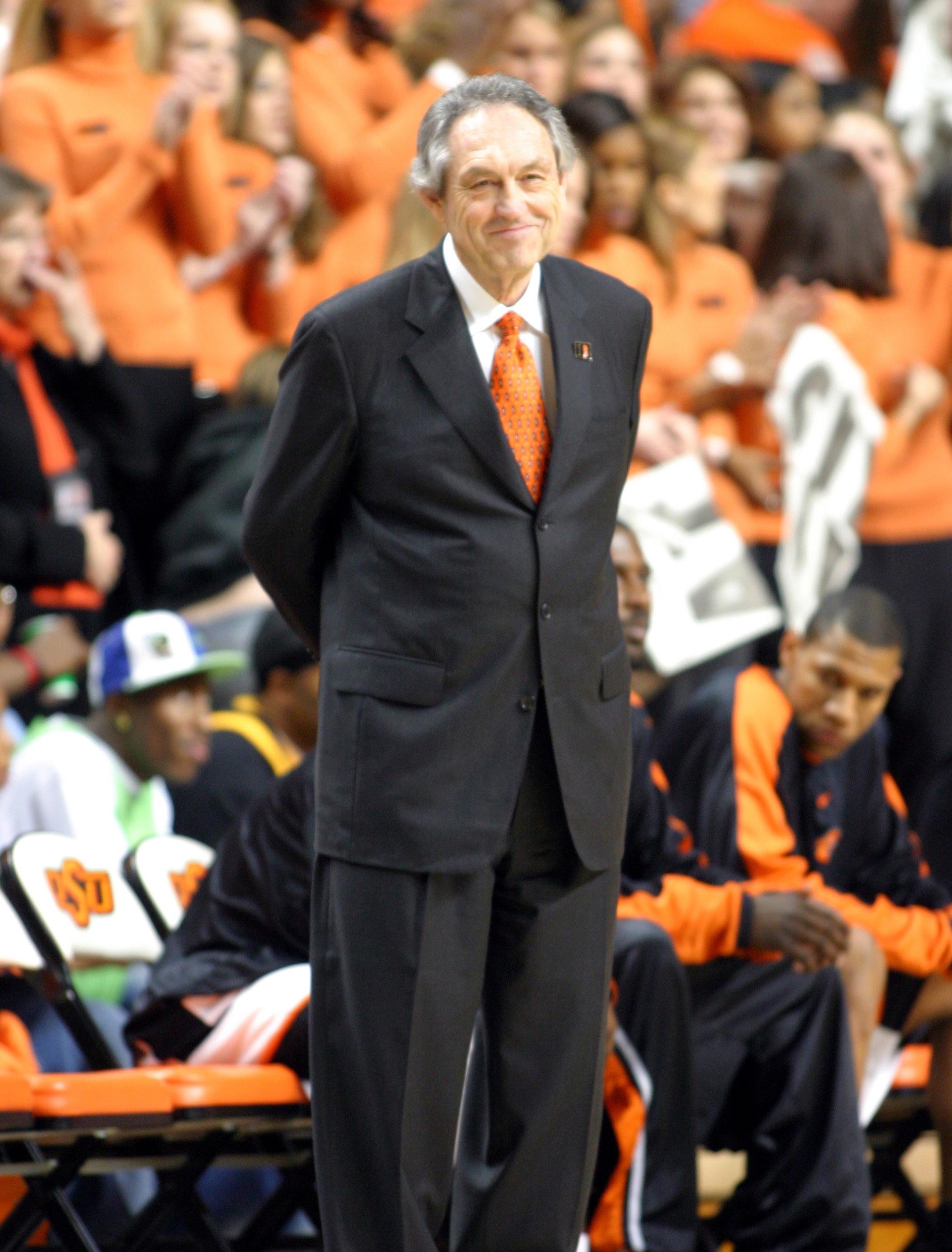
Eddie, Eddie, Eddie … Something to Cheer About
BY HARRY BIRDWELL
One night after a nationally televised Cowboy basketball game on ESPN, Coach Sutton and I were chatting with Dick Vitale.
“Oh, Eddie,” he began (can’t you just hear him?), “I loved the chant: ‘Eddie, Eddie, Eddie.’ Where did that come from?”
Coach Sutton deadpanned, “Oh, I guess they think we are doing something right. But it warms my heart on a January night!”
Since he died, I have asked myself what it really was that carved Eddie Sutton’s image onto the Mount Rushmore of OSU Athletics as one of the most beloved Cowboys ever.
Perhaps it was that when he returned to OSU in 1990, he came to the rescue of our university when the condition of our athletic facilities was causing the other members of the Big Eight Conference to demand improvement or risk sanctions — possibly even expulsion from the league.
Maybe it was that he was warm and friendly to every member of the OSU fanbase, from the greatest to the least.
Maybe it was because so many in every crowd at Gallagher-Iba Arena had received a hand-written, encouraging and congratulatory note from him.
Perhaps it was how he handled and managed the affairs of the OSU Basketball program with integrity and competence.
Could it have been that so many knew he was a “second father” to the hundreds of young men he coached at Oklahoma State?
Or just maybe we knew we were seeing a “master teacher, a sociologist and a psychologist” who counseled while carrying a basketball under his arm, daring young men to dream beyond all expectations.
Perchance we all recognized a guy who gave us pride in our university and brought OSU Basketball back into elite prominence.
Perhaps it was to acknowledge a man who played a major role in the development of the national “Coaches Versus Cancer” program and who spent many days in cancer wards comforting, spreading goodwill and encouraging children in need of hope.
Perhaps the “Eddie, Eddie, Eddie” chant was just to say “thank you” for the role he played in leading the Cowboy Nation through a tragedy that brought the university to its knees.
Could we have known that our cheers were good medicine to help heal his broken heart?
Maybe it was about thanking the coach who made OSU Basketball tickets the “most valued” in the state.
What if it was to recognize him as one who made you want to camp out on bitter cold Oklahoma nights while he helped deliver your pizza, so that you could get one of those coveted tickets to watch the Cowboys’ next game?
Might it have been to appreciate the coach who helped create the rowdiest, home teamfriendly environment in America, where the noise was deafening and intimidating to opponents, where the excitement caused your pulse to race, where your love of Cowboy Athletics became a passion for life?
It could be as simple as he lifted our expectations for OSU and showed us the possibilities for our alma mater, impacting thousands of us to invest from out of our success into OSU’s future for its students and facilities.
Would it be to salute a man from a very ordinary beginning who, despite fame and success, continued to maintain the “common touch,” loved his wife and family and treasured his OSU friends he called “SPACIAL” in his down-home drawl?
Maybe it was because of how he shared our dreams, raised our expectations, and sent our pride through the roof at Gallagher-Iba Arena.
I believe it was all that and more.
For as long as Cowboys remember Eddie Sutton, don’t forget how a simple repetitious chant filled Coach’s soul as little else could.
Be grateful for his legacy, and never forget how we celebrated “Eddie, Eddie, Eddie!”
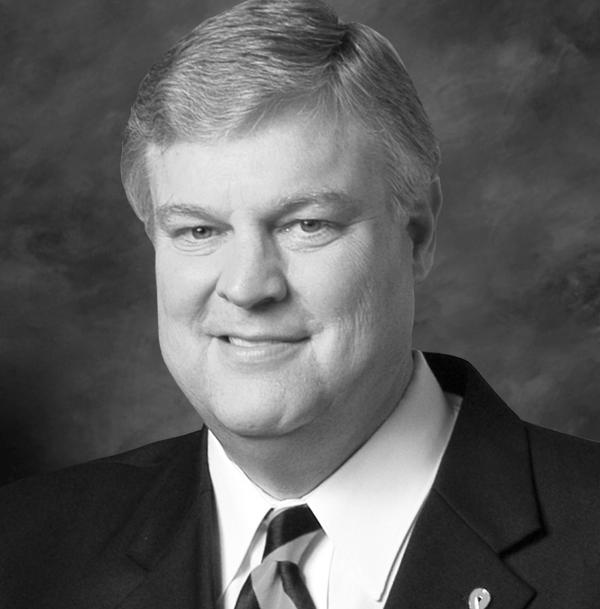
Harry Birdwell is an OSU graduate, former staff member and also served as Oklahoma State’s athletic director.
more than a coach
BY KAREN AND ANDREA HANCOCK
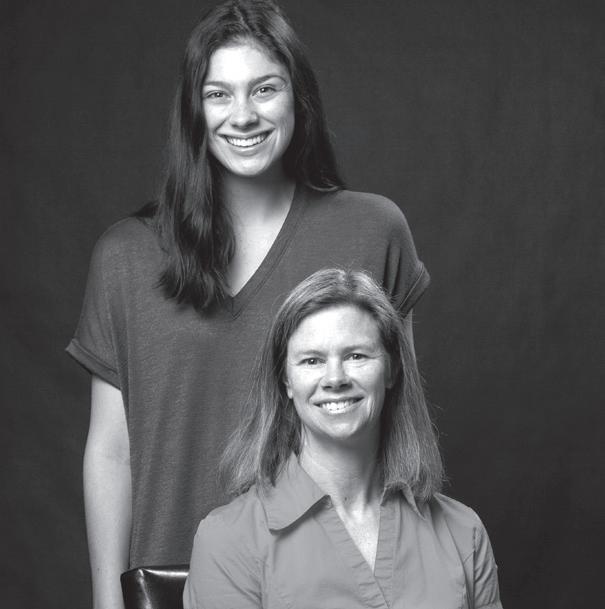
Karen Hancock started the OSU women’s soccer program in 1996 and currently serves as the program’s assistant coach. She also is the senior woman administrator for OSU Athletics. Andie, who was the two-month-old baby referenced by Karen, just completed her freshman year at Northwestern University in Evanston, Ill.
My relationship with Eddie Sutton can be broken down into two parts: prior to January 27, 2001, and after January 27, 2001. Many in the Oklahoma State family know that date. It’s the date when a plane carrying 10 members of the men’s basketball team’s travel party crashed in a snowy field outside Strasburg, Colorado, killing all on board while traveling home from a conference game.
The crash took the life of my husband, Will Hancock, who I had been with for eight years and married to for four. He was the team’s media relations coordinator, and part of his job was to travel with the team to every away game. Will felt blessed to be working with the OSU men’s basketball program where he interacted with what he knew was a future hall of fame coach in Eddie Sutton. He used to come home, describe his impressions of Eddie to me, and tell me what a strong personality he was. People were drawn to Eddie, according to Will; his staff worked hard for him, and his players, without a doubt, would have followed him to the ends of the earth.
Whatever the “it” factor was, he had it. He reminded Will of his maternal grandfather — a small town attorney in southwest Oklahoma. He would talk about how Eddie was revered by players and staff alike. Will certainly revered him. He would watch most practices, and on occasion, I would join him. I knew at the time that I was witnessing greatness in coaching. He had it all. The brain, the awareness, the confidence, the voice, and all of the results in competition to back it up. It was something to watch.
I’ve worked for OSU Athletics for as long as I’ve been in Stillwater. When Will and I first arrived in 1996, I had my hands full with starting the women’s soccer program while Will was working in the media relations office. We had this beautiful blend of work and personal life that intertwined through OSU Athletics. For example, my schedule allowed me to tag along on a handful of men’s basketball trips to Hawaii, Las Vegas and then the NCAA Tournament games in Buffalo and Syracuse in 2000. During those trips I would get to observe even closer how Eddie operated as a coach. And I tried to take notes as a young coach at the time. But on a personal level, Eddie seemed out of reach to me. I felt too far outside of the circle to get to know what he was like.
That changed after January 27, 2001. Before the crash, he was always very cordial and polite to me, but a little distant. Maybe I was just the spouse of one of his support staff members at that time, but after the crash, it seemed very clear that I was a spouse of a man who died under his watch.
In the weeks and months after the death of the 10 men, I could not imagine what he was enduring. Personally, I was in survival mode: I had a two-month-old daughter to care for on my own, and most of my thinking revolved around how I was going to make it with an unexpectedly fatherless infant. Most of my attention was on how my family members and I were struggling with our loss. But as time passed, I started figuring out how hard it was on Eddie, too. The more I could step outside my own circumstances, I could see what it did to him. Because whatever I had going on as far as grieving, he had it times 10. You could see it on his face. You could hear it in his voice.
He was always so good to me after Will died. He opened up more to me. He would ask me about the soccer team, and we would talk about coaching in general as a common ground. He was also always quick with a compliment about Will when he could fit one in. He would express to me how much he missed him and all of the 10. It was a significant comfort to me.
Before our daughter was born, one of the things Will and I liked to do was go to the movies. We quickly learned that Eddie and Patsy loved going to the movies, too. It seemed
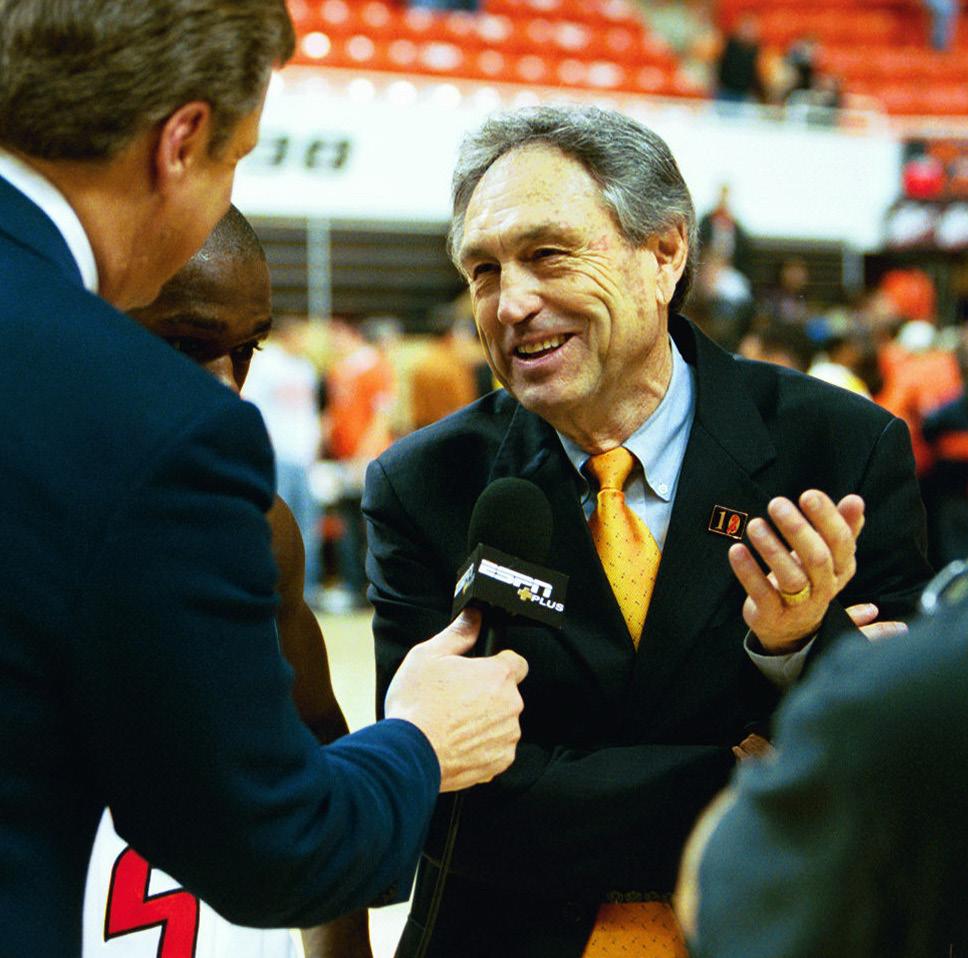
like just about any Friday night that we went to the theater, we would see them in line. They must have gone every weekend, as I do not remember us being there on a Friday night without seeing the Suttons. They would see us, say hello, and we would talk about what we were going to see. Most of the time, Eddie and Patsy were watching new releases while Will and I would watch movies that had been out for a couple of weeks, so we always looked forward to hearing Eddie and Patsy’s review. After the crash, Eddie and Patsy knew I had lost my movie-going partner, so they invited me to go with them. I went. I wasn’t sure how it would go, but I knew that they were trying to find anything they could to try and make me feel better. So we would go, and they went out of their way to be kind and accommodating to me. They always picked me up at my home. I always got to pick the movie, and they always bought my tickets and concessions. After a while, I decided I should let them enjoy their date night without a third wheel, and we eventually stopped going, but I always thought the gesture was so kind — proof of what great people they were. I’ll always remember those efforts by them fondly.
The last time we went to the movies early that summer Eddie finally told me what I think he had been wanting to tell me since January. He was driving me back to my house, with Patsy in the passenger seat and me in the back.
“If it could have been me instead of Will, he said. On some level, I already knew that. Nevertheless, it was very powerful hearing him give voice to it. I knew he carried around a lot of guilt. And as a fellow coach, maybe I could empathize with losing people under your charge and feeling the weight of the responsibility. I told him that I believed him and wanted him to know that it was okay. It was simply a horrible accident. His admission was nice, but he and I were both aware that it didn’t take away the pain. I know it took a toll on him. There was no way to escape the gravity of that kind of loss.
I also know that the crash led him to emphasize with me and others that if we love someone, we should tell them. “Tell them every day,” he always said. I’ve tried to be better about that in my life, but it does not come easy to me to be that vulnerable. I told Coach Sutton nearly every time I saw him over the last five years that I loved him. Unfortunately, as I was getting to the point where I had the courage to say it, he was getting to the point where he couldn’t say it back. But that didn’t matter to me. It was more about me making sure that he was hearing it from me. After all, that was the lesson he was trying to impart. “Tell them.” I think of those two words often and know I will carry that strong voice of his in my head
or any of those guys, I would have traded,” the rest of my life.
A year ago, at the 2019 Remember the Ten basketball game, my mom and I went down to courtside to visit Eddie. We asked him how he was doing, and he leaned towards me and started talking. It wasn’t easy for him to talk by then, and I couldn’t hear him over the roar of the crowd in Gallagher-Iba.
When he realized this, he did something I’ll never forget: he simply reached out and took my hand, and we sat like that together in silence, watching the game hand in hand.
I tell you this because I think it exemplifies something my mom said. Eddie believed in telling people he loved them, but he also showed us that there are more ways to say “I love you” than by simply using those three words.
Taking my mom out to the movies after my dad died? That was love. Taking my hand that night at the game? That was love. Eddie taught me that love isn’t a word — it’s an action, and I will carry that lesson with me forever.
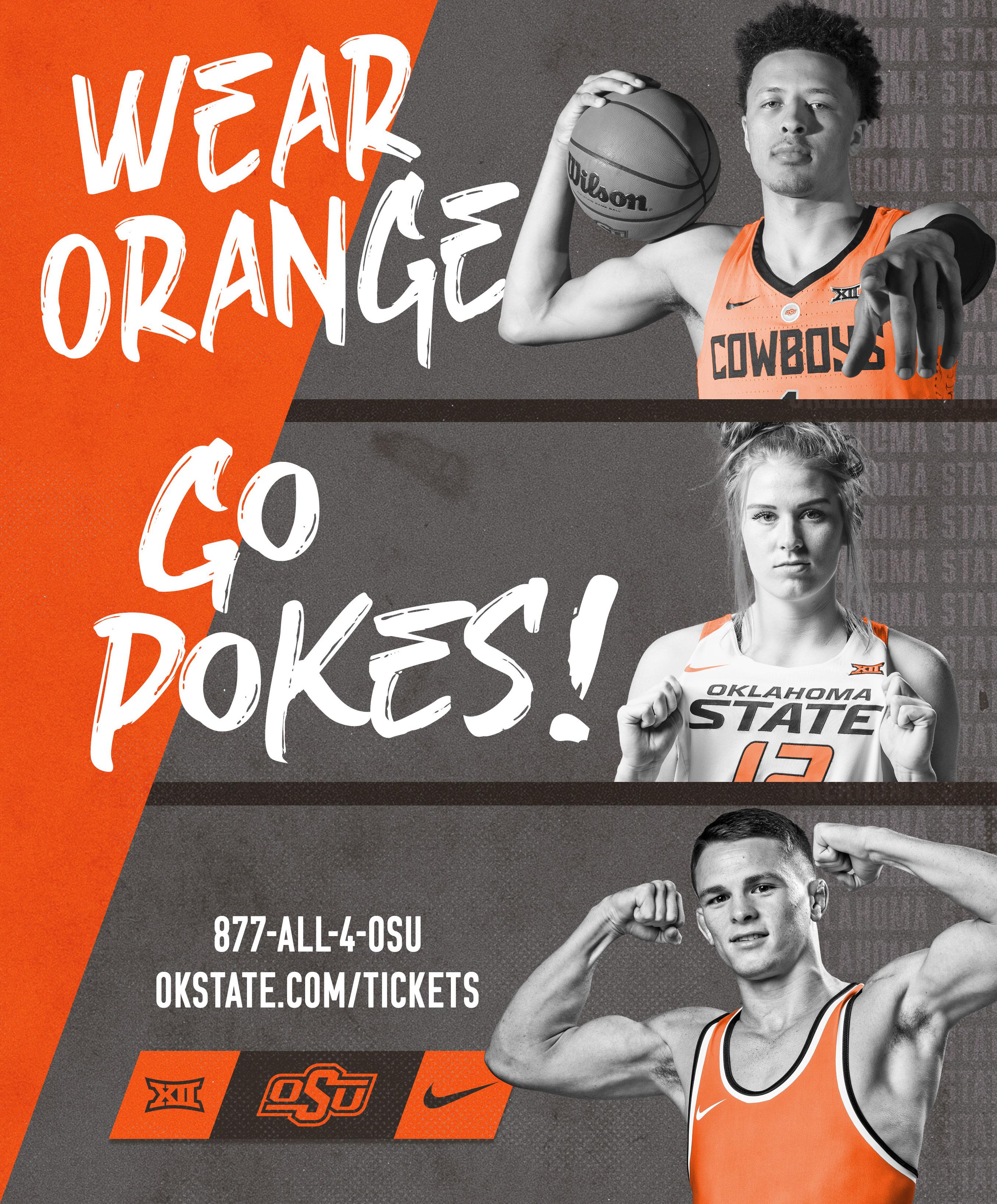
same neck OF THE woods STORY BY CLAY BILLMAN






